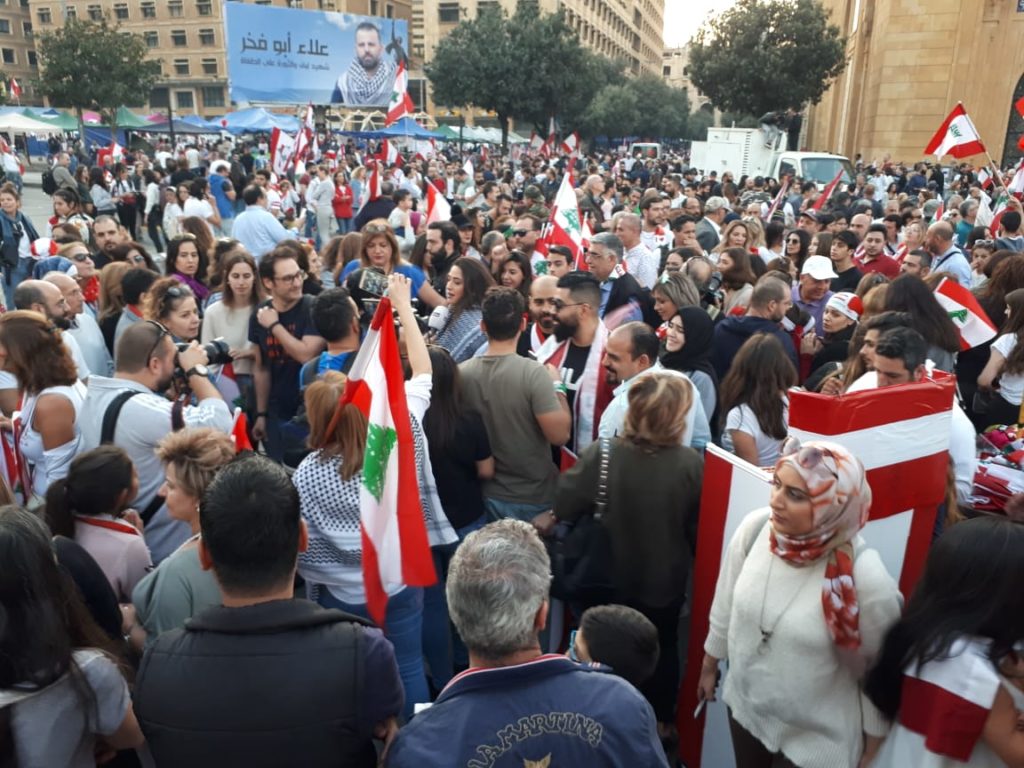A Humanitarian Crisis Threatens Lebanon. We Need Your Help.
Posted in: Voices from the field
Samar is Anera’s country director in Lebanon
Lebanon is on the verge of a humanitarian emergency. Due to an escalating financial crisis sharpened by the mass protest movement, the economy is shutting down as are the social services that families depend on.


It has been two months since the start of the protests — a revolution really — in Lebanon. Since the initial protest on October 17th, the situation has escalated. The financial crisis, which was a problem before the revolution, has gotten increasingly worse. The value of the Lebanese pound is plummeting. The IMF predicts that more than half the population will be living under the poverty line by the end of 2019. Hundreds of companies have already closed and many more are threatening to do so. Many who are still employed have seen their salaries slashed.
Because dollars can no longer be withdrawn from ATMs, many of us spend hours in line at banks to withdraw money. Demonstrations have remained mostly peaceful, but there have been violent clashes between protesters and establishment supporters and security forces, some of which have unfortunately proven deadly. This past weekend was particularly violent and bloody.
Although the roads are now open, movement in and around Beirut and throughout the country has been haphazard and can change in a moment. Anera’s staff and programs are greatly affected, yet we are still working as diligently as ever. I am very proud of our staff here. They are, of course, concerned about the safety and well-being of themselves and their families. But they are also working extra hours, because they are committed to responding to the crisis. We have daily check-ins among staff, volunteers, and partners, including with UNICEF and UNHCR.
Some of our programs have been badly affected by the latest crises. Attendance is down for all of our formal and informal education courses. One of the worst is our apprenticeship program. We had opportunities lined up for many apprentices and were working toward 30 percent employment. All of that has collapsed around us. There are no opportunities now. So we are adapting our work to the new circumstances.
In order to address immediate needs, our programs now are largely redirected toward humanitarian response. We’re paying our hospitality vocational education graduates to work in communal kitchens to make meals for hungry families. Our construction grads are prepping refugee shelters for winter. Sewing grads are making baby kits and warm clothes for those who need them. I’m proud to say that Anera is a leader in responding to what is happening in Lebanon.


We do not know how or when this will end. We, and all of Lebanon, hope that the revolution remains peaceful. Civil war is still too fresh in all of our minds. All we can do for the time being is to continue working, as best we can, fulfilling Anera’s mission to provide humanitarian relief to those in need. This is how Anera’s community of staff, donors and partners can make the biggest, most life-saving difference in this revolution.
Health Care in Crisis
The health care sector is experiencing a shortage of supplies and medicines. Our partner health clinics expect a medical catastrophe to follow if the situation in Lebanon continues to decay. With no political solution in sight, we must prepare now for the worst to come.
We have already identified a 20 percent increase in the gap between the supply of medicines available and the quantities needed. We estimate that within three months the gap will increase by 50 percent. Prices for these items are soaring as inflation increases at stupefying rates — for the month of October alone, inflation rose five percent.
This health care crisis is driven by the nation’s reliance on the U.S. dollar. Much of the country’s crucial business is conducted in dollars, rather than the Lebanese pound. Even Anera’s staff are paid in dollars. And importers use dollars to pay for imports of food, medicines, and fuel. Usually, Lebanon imports around 1.2 billion dollars worth of pharmaceutical items per year. Because there is now a shortage of money, importation has ground to a halt and there are major, life-threatening shortages.
Unfortunately, in times of crisis, the already vulnerable are the first to be hit, and often the hardest. Our recipients are telling us that already kidney dialysis and cancer patients have had to reduce their treatments due to shortages of their medications. We expect that with the deteriorating economic situation, more and more Lebanese and non-Lebanese families will fall under the poverty line and be dependent on the public health care system, which will further exacerbate the medical shortages.
The Anera Community is Taking Action!
You, our valued partners and donors, can help combat this shortage and save lives. We are shifting our programs toward humanitarian aid and increasing our focus on medical donations. This is where we believe we can have the largest and most immediate impact during this crisis.
With your help, Anera can provide essential medicines and supplies, helping to meet the needs of kidney dialysis and cancer patients, among others. We can ensure that clinics serving Palestinian and Syrian refugees and vulnerable Lebanese do not run out of life-saving medicines. We can provide struggling families with the supplies they need to live with dignity through this revolution and financial crisis.
Thank you, valued partners. We can only do this with your help.
OUR BLOG
Related
In Gaza, where families are often living on the edge of survival, Anera’s comprehensive healthcare services offer a lifeline for mothers and children to address issues like malnutrition, breastfeeding support, and maternal care. The Challenges Mothers Face The challenges faced…
With support from the Lebanon Humanitarian Fund, we’re providing urgent humanitarian assistance. The recent war between Israel and Lebanon has left southern Lebanon, the southern suburbs of Beirut, and parts of the Bekaa Valley reeling from destruction. Entire neighborhoods have…
In this log, Anera provides updates on unfolding war in Palestine and our response. Please stay tuned here for the latest information. To subscribe for weekly updates via SMS on our response in Gaza, text GAZA to 1-866-549-0055. Questions? See…

